Linden Hall High School has adopted an English immersion approach, and teaches almost every subject, other than Japanese etc., in English.
We are a secondary school that offers a six-year integrated junior and senior high school experience. Our programme is characterized by a flexible curriculum that is not restricted by the ordinary three/three year split between middle school and high school. By eliminating the duplication of topics covered in each subject in middle and high school textbooks, we empower students to speed up their learning.
As a result, our students are able to complete the full compulsory high school curriculum specified for Ichijou-Kou* by their first year of high school. In their second year of high school, students choose either the International Baccalaureate Course (IB Course) or Think and Inquire Course (TI Course) in accordance with their future goals, progressing to more advanced studies.
*Ichijou-Kou refers to educational institutions stipulated in Article 1 of the School Education Law in Japan, and includes kindergartens, elementary schools, junior high schools, compulsory education schools, high schools, secondary schools, schools for students with special needs, universities, and technical colleges.
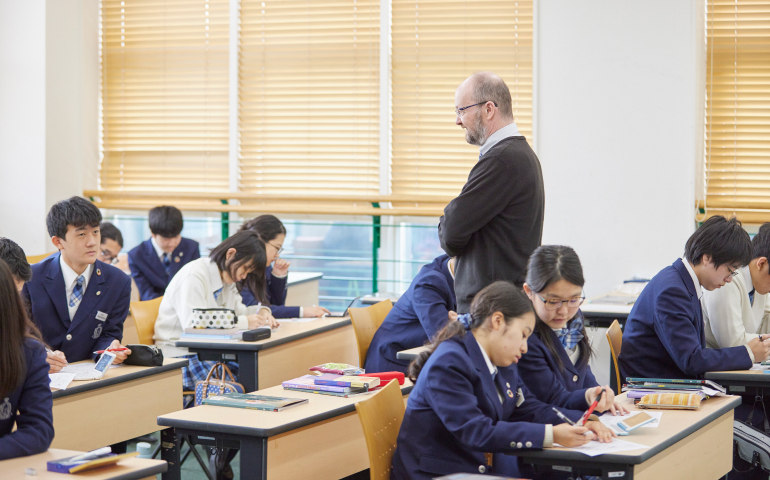
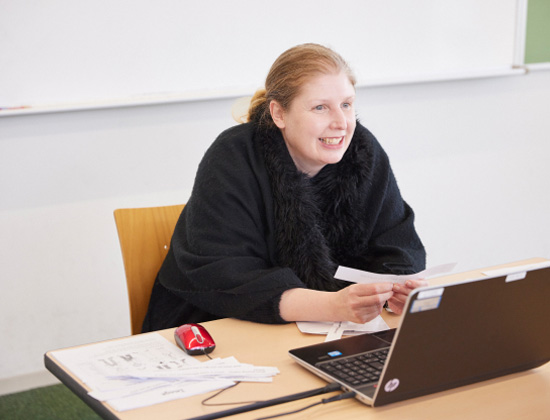
With the aim of helping them achieve mastery of the English language, we provide a learning environment that encourages students to voice their opinions with confidence. In particular, we focus on the output skills of speaking and writing. In addition, students develop the ability to think independently through engaging in debate and essay writing.
Presentations and discussions abound in our classes, allowing students to practise communicating their thoughts and opinions using sound reasoning and logic.
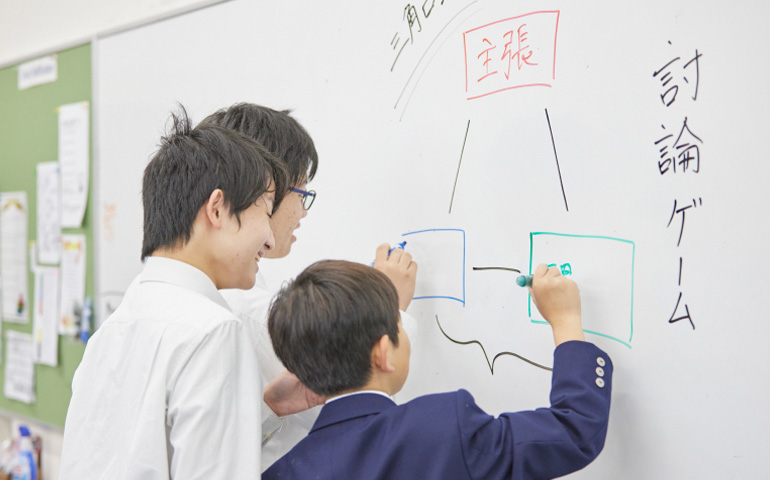
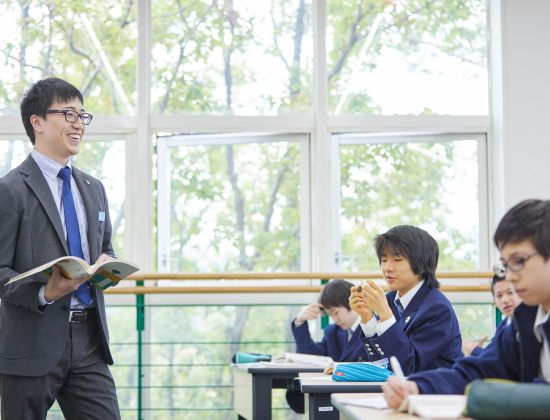
While reaffirming the value and importance of Japanese as their first language, students acquire the foundational skills to fully understand and appreciate contemporary works as well as the classics.
Classes are not just for students to obtain knowledge through textbooks, but also for them to develop projects, seek answers and solutions, and deepen their knowledge. Through this, they learn to utilise different communication styles depending on their specific purposes and intentions. They develop their critical thinking skills, enrich their inner selves, and refine their linguistic competencies.
This course, characterized by multifaceted studies on topics such as human relations, understanding of different cultures, and global issues, fosters in students an international perspective.
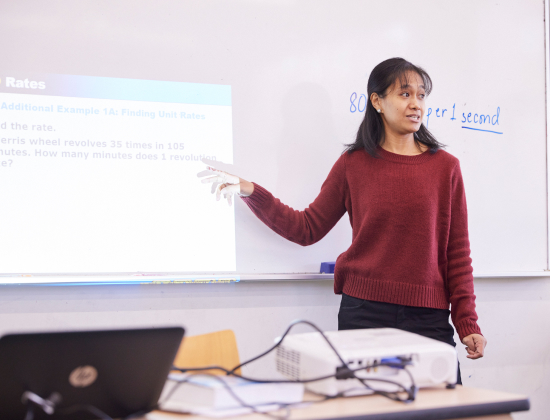
Students learn about the fundamental connections between mathematics and other disciplines, acquiring the aptitudes required to apply mathematics to address a multitude of societal issues.
Using mathematical reasoning techniques, students develop stronger logical thinking skills. Through activities such as data collection, analysis, and evaluation, they gain the statistical skills necessary to thrive in this era of big data and artificial intelligence.
In the classes, we take up examples from students’ daily lives to help them understand how deeply related mathematics is to a variety of academic fields and how applicable it is to solving a wide variety of societal problems. By discovering the importance of learning mathematics and its versatility in practice, students develop a more open attitude toward mathematical activities requiring innovation and creativity.
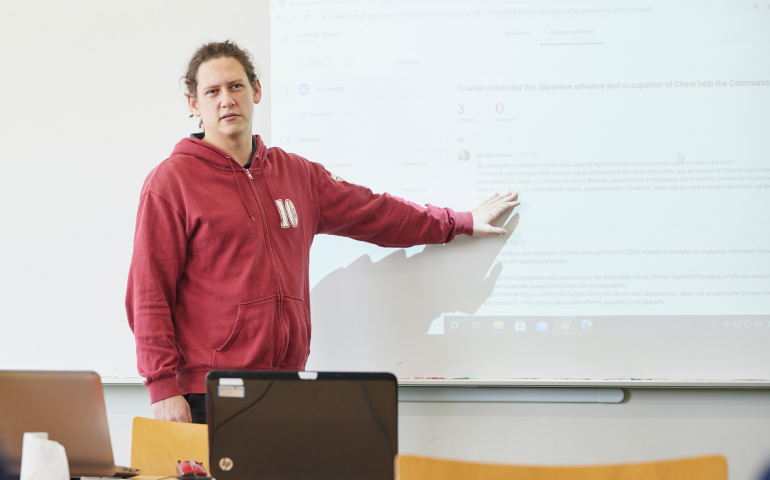
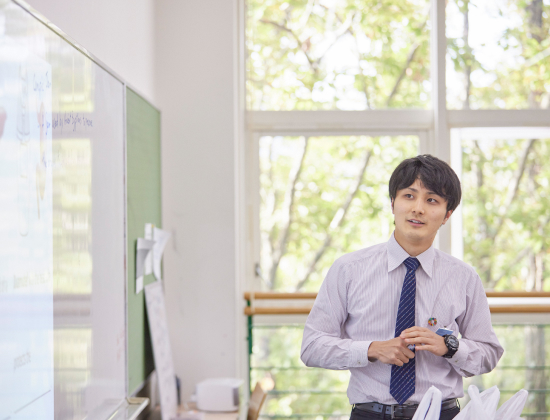
The purposes of this class are to encourage students' interest in societal issues we face in an increasingly globalised age and to develop their ability to analyse such complex issues from multiple angles.
Through studying world history and geography, students better comprehend the value of diversity and complexity of human cultures. In learning about the history of Japan from ancient to modern times, they cultivate a greater self-awareness as Japanese citizens living in an international community.
Students research particular set themes to do with societal problems in Japan and other parts of the world, acquiring the ability to organise their thoughts and findings before problem solving. In addition, through presentations and group discussions, students deepen their knowledge of historical and contemporary societal issues and learn to express their opinions persuasively.
By designing posters for each theme and participating in mock trials and stock market experience games, students gain inquiry and active learning skills in both English and Japanese.
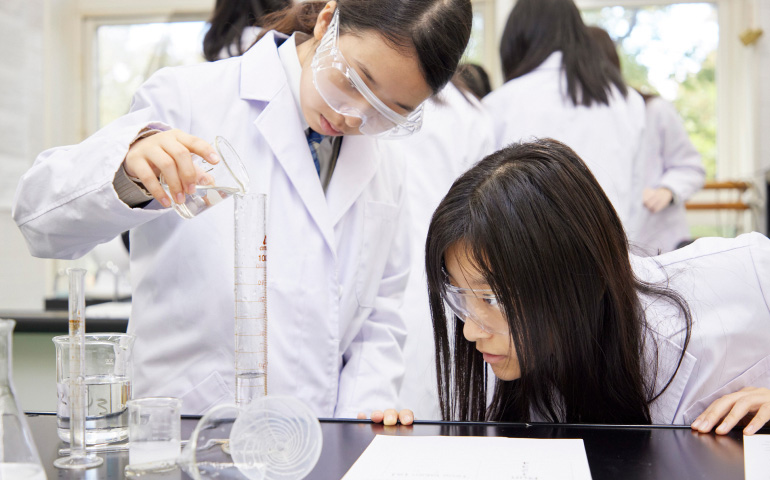
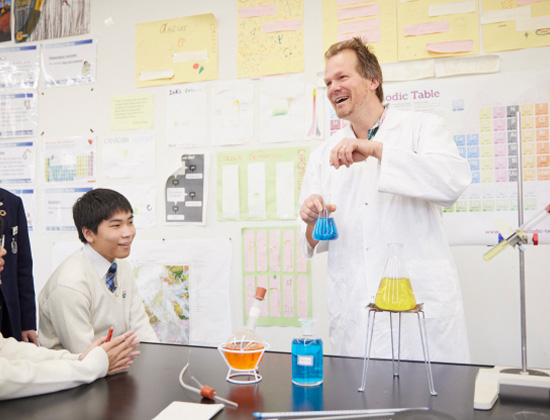
Students acquire scientific reasoning skills and perspectives by approaching natural phenomena from the main viewpoints of energy, matter and life, and discovering universal theories. To this broader purpose, we not only explore the knowledge handed down by past scientists, but also encourage fluency in skills such as scientific experimentation and presentation of findings.
Our classes, conducted by an international teaching staff, are characterized by engaging learning activities that encourage the application of theory, such as scientific experiments and crafting presentation materials. With outdoor ecological surveys and more advanced chemistry experiments covered in IB classes than those typically offered in Japanese high schools, students enjoy ample opportunities to develop the scientific inquiry skills relevant to today.
In order to stimulate students to think critically about the world around them, we employ research-based learning, open-ended questions *, experimentation, etc.
*(questions to which the answers are not limited to a simple “yes” or “no”)
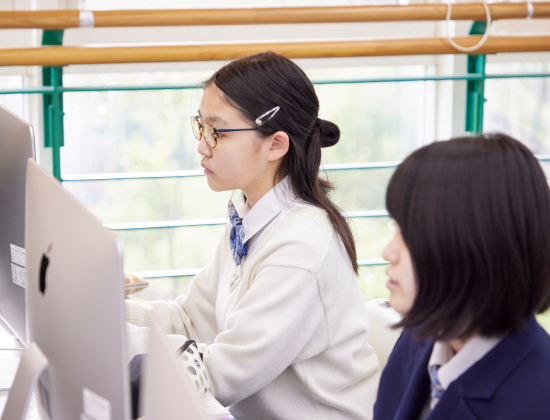
Infocomm and technology are essential in modern society. In our classes, students gain the technical knowledge and skills needed to contribute to the advancement of society. We see the ability to communicating information as critical for students to succeed in the current world.
To help students gain self-confidence as they develop new technical skills such as programming, we break down the learning into baby steps, allowing students to experience multiple small successes. In addition, we emphasise not only the acquisition of information transmission skills but also hands-on experience with communication.
We also integrate infocomm and technology into various subject classes. For instance, in maths, we used PowerPoint to draw the emblems of the 2021 Tokyo Olympics and Paralympics. By rotating and arranging 3 types of diamonds (30 , 60 , 90), we formed a kumiichimatsumon* pattern. The filling of two-dimensional planes with polygons is a topic that mathematicians are continuing to research, yet easily understandable for junior high school students.
* This work by Asao Tokoro depicts in indigo, a traditionally used color, a checker design known as ichimatsu-moyo from Japan’s Edo period. Combining 3 types of rectangles, the design incorporates the message of diversity and harmony. It is also the official emblem of the Tokyo 2021 Olympics.
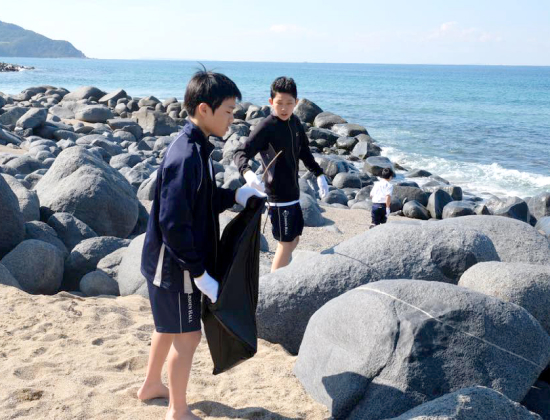
Considering the environmental issues of today as well as the economic, financial, and societal factors involved in tackling these issues, students discuss and debate the ideal steps we should take to benefit humanity for the long-term.
To this end, we first address the Earth's environmental systems, or ecosystem fundamentals. At the same time, students engage in activities such as conducting ecological surveys in the school garden, thereby recognising the relevance of their studies to their daily lives. By doing so, students deepen their interest in the Earth’s wellbeing as essentially interrelated to their own wellbeing.
At Linden Hall High School, we extend education outside the classroom. Students participate in an annual cleanup of the Itoshima coastal beaches and contribute to projects such as “Art Mile” (2019) and “Power of Clothing”.
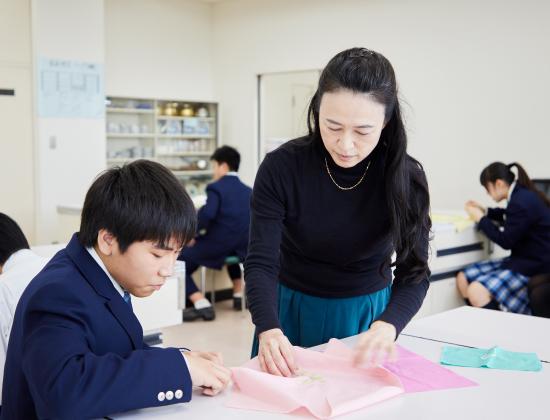
Students deepen their awareness of the roles they play in their families and societies, develop teamwork and collaboration skills, and cultivate the qualities needed to build a better world.
The specific knowledge and skills taught in home economics classes vary by students’ lifestyles and ages. Through creating basic personal finance plans and recording their expenditures, students develop responsible consumption habits.
They also study home economics from a global perspective, becoming aware of their individual contribution to creating a more sustainable society.
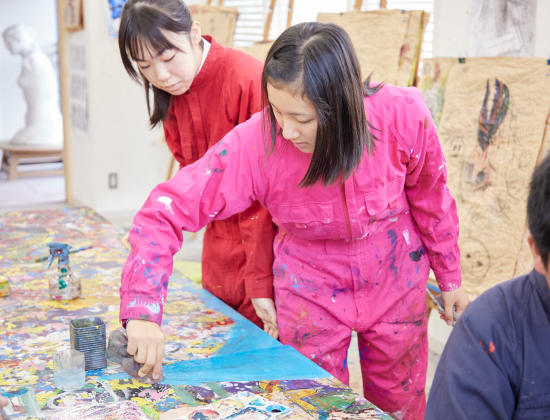
Through creative activities and aesthetic experiences, students gain a deeper understanding of the arts and culture.
This class is team-taught by Japanese and foreign instructors.
We create art through team collaboration, considering and balancing the elements of beauty, color and expression. Collaborative production is, to many, one of the most valuable experiences a student can have in the arts.
These activities serve as opportunities to hone each student’s unique aesthetic senses, developing the imagination and inspiring originality.
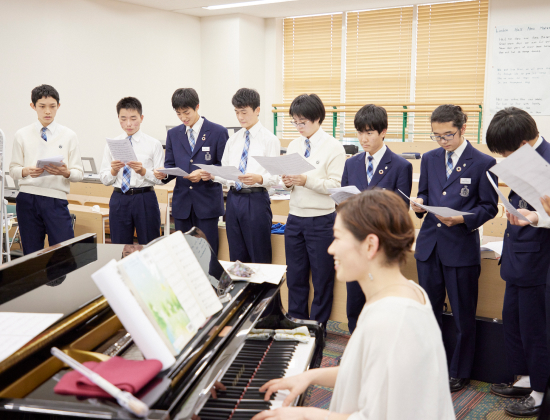
Through music, students can enrich their lives.
A main feature of our classes is the opportunity to gain appreciation for various cultures through exposure to not only classical music, but also music from a wide range of genres, styles, and world regions.
In addition, we teach music theory in English so that students may continue to enjoy music well into their adult lives, wherever they may be.
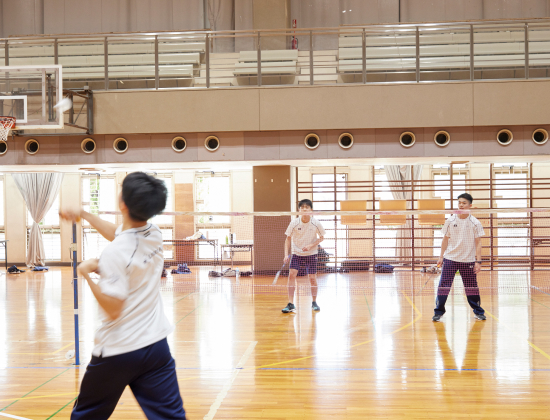
Through our physical education classes, students develop a greater awareness of and control over their physical bodies, which they can benefit from throughout their lives. We focus on the enjoyment of physical activity, healthy habits, sense of achievement and competition, and building team relationships.
Physical education is, perhaps more than any other subject, inherently experiential. While giving due consideration to safety, we structure lessons so that they encourage pair and group activities as well as peer teaching.

Loading